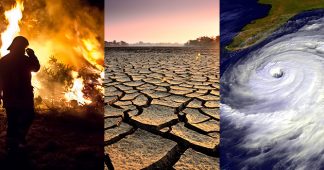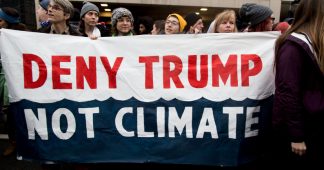Trump’s decision to withdraw from the Paris climate change agreement is another in a growing list of actions that exemplify the thoroughly reactionary character of his administration.
Behind the pseudo-populist “America first” rhetoric of his speech on Thursday, which bore the unmistakable imprint of Trump’s fascistic chief of staff Stephen Bannon, is the assertion that nothing will be tolerated that places the semblance of restraint on the rapacious operations of the corporate and financial aristocracy. If the Earth is to be poisoned and burned as a result, so be it.
Trump’s domestic and international rivals seized on the occasion to posture as defenders of the environment. Editorials in the New York Times and Washington Post called Trump’s action “shortsighted” and “self-defeating.” In Europe, Italian Prime Minister Paolo Gentiloni, German Chancellor Angela Merkel and French President Emmanuel Macron issued a joint statement declaring that the agreement would not be renegotiated, and that “it is a vital instrument for our planet, societies and economies.”
Such criticisms, however, have far less to do with the actual issue of climate change, let alone serious measures to halt the warming of the Earth, than they do with the international and domestic conflicts between different factions of the ruling class. Led by Germany, the European powers are using Trump’s pullout from the Paris agreement to bolster a campaign aimed at asserting their independent economic and geostrategic interests amidst a growing transatlantic divide.
Domestically, the criticism of Trump’s actions intersects with deep conflicts within the ruling class, centered on issues of foreign policy. Samantha Gross of the Brookings Institution sounded a general theme when she called the decision a “huge foreign policy blunder” that would undermine the global position of the United States. She worried, “Might China be looking to fill the leadership role that the United States is vacating?”
Climate change is a real threat that requires urgent action. It has been understood since the first Intergovernmental Panel on Climate Change (IPCC) report in 1990 that global warming is a result of carbon emissions (primarily carbon dioxide and methane) into the Earth’s atmosphere from human industrial and agricultural activity. Since then, reports by scientific bodies have expressed the unanimous conclusion that catastrophic consequences can be avoided only through immediate and far-reaching measures.
The problems that were predicted nearly 30 years ago are already manifest. Sixteen of the 17 warmest years on record, going back 136 years, have occurred since 2001. Stronger heat waves and longer droughts have interfered with agricultural production around the world. The Amazon rainforests almost ignited on a mass scale in 1998, 2005 and 2007 due to drier and hotter weather. Sea levels have already begun to rise, caused by the warming of the oceans and the expansion of water that occurs when its temperature increases. This, in turn, has exacerbated the flooding that accompanies hurricanes and typhoons.
Coral bleaching—stress induced on coral by warmer ocean temperatures and higher oceanic acidity—has already killed off nearly half of the Great Barrier Reef, a key part of the planet’s food chain and general ecological balance. Glaciers in Antarctica and Greenland are poised to fall into the ocean, which would immediately raise sea levels and disrupt weather patterns worldwide. Animal species are dying off as habitats are suddenly changed or new diseases, which thrive in the warmer climates, are introduced.
The seriousness of the situation stands out starkly against the measures agreed by the capitalist powers. The Paris agreement, generally preceded with the word “landmark” when mentioned in the media, is, in fact, toothless. It consists of nonbinding promises with the stated goal of keeping the global temperature rise below 2 degrees Celsius, slightly more than twice the current level of warming.
At the time of its adoption in 2015, leading climate scientist James Hansen aptly characterized it as a “fraud” and a “fake.” That the Paris agreement has the support of major corporate giants, including energy companies such as Exxon Mobil, says everything about its true character.
The 1997 Kyoto Protocol, which the Paris agreement replaced, was also inadequate, but it failed because the major capitalist powers, led by the United States, rejected its binding targets. Participating in negotiations in advance of the Paris accord, then-president Barack Obama, who liked to give flowery speeches on the danger of climate change, insisted that the United States could not be legally bound by any new climate agreement.
To seriously address climate change requires a major reorganization of economic life on a global scale. The framework of energy production has to be transitioned from one that uses fossil fuels to one that relies on renewable energy. This, in turn, requires an international effort, involving a massive influx of funding for infrastructure, the development of current technologies and the investigation of new ideas, rather than the squandering of trillions of dollars on war and the self-enrichment of the world’s billionaires.
The technology exists to solve these problems, while at the same time increasing the living standards and quality of life of the world’s population. However, it is not possible to do so within the framework of the capitalist system.
Efforts to address climate change come into conflict with the two basic contradictions of the world capitalist system: the contradiction between a global economy and the division of the world into rival nation-states, and the contradiction between socialized production and the subordination of economic life to the accumulation of private profit.
That humanity has come to the point where its actions have a far-reaching impact on global climate patterns is an expression of the enormous impact of the development of the productive forces. Yet these productive forces remain trapped within an outmoded and irrational socio-economic system. Their further development, on a rational and scientific basis, requires a complete reorganization of social relations.
The same contradictions of the capitalist system that prevent any serious measures to address climate change also produce imperialist war, which threatens the entire planet, and the growth of poverty, unemployment and social inequality. These contradictions are at the same time politically radicalizing workers around the world.
Like every other major problem confronting mankind, climate change is fundamentally a class question. It is the working class that will suffer the brunt of the impact of global warming. It is the working class that is objectively and increasingly defining itself as an international class. It is the working class whose social interests lie in the overthrow of capitalism, the abolition of private ownership of the means of production, and the establishment of an economic system based on the satisfaction of human need, including a safe and heathy environment.
The dangers posed by global warming can be addressed only through a political struggle by the international working class against the anarchic and backward capitalist mode of production. Only in this way can the world’s economy be rationally and scientifically reorganized and an environmental catastrophe averted. In short, the solution to climate change is socialism.
Bryan Dyne











